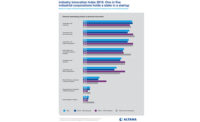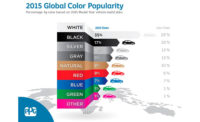WESEL, Germany – Major German corporations are increasingly taking stakes in startups in order to profit from their creativity. One in five companies with more than 1,000 employees have taken a share in startup enterprises as a means of promoting innovation. Such shareholding models are found much less often in smaller enterprises. Only one in 10 enterprises with fewer than 1,000 employees are pursuing this strategy. These are some of the findings of the Industry Innovation Index 2015. This cross-sector study, conducted by the forsa institute on behalf of the specialty chemicals company ALTANA, surveyed 250 top decision makers and 250 entry-level employees in German industrial companies.
"German industry has an undeniably great innovative strength, and that's precisely why we can also learn from new market players and from other countries," says ALTANA CEO Dr. Matthias L. Wolfgruber. "Innovative capability is always connected with the sharing of knowledge. I personally admire the entrepreneurial courage in the U.S." The study confirms that Germany presents underutilized potential in this respect: two out of five industry managers say that their company has little or no willingness to assume risk. Entrepreneurial courage is a strong feature of only 14 percent of companies.
Cooperation as Well as Financial Stakes
In addition to financial shareholdings, German industrial enterprises also use other forms of networking to promote innovation. Ninety-two percent depend on cooperation with their customers, for instance in the area of joint product development. Eighty-seven percent work together with service providers, while 86 percent regularly share information with trade associations. Academic partnerships follow with 77 percent. Seventy-two percent join up with networks and think tanks. Sixty-three percent of the companies surveyed pursue partnerships with other industrial enterprises. These networking strategies are used proportionally more frequently by large corporations and less often by medium-sized enterprises.
External Knowledge Often Not Systematically Utilized
The externally acquired knowledge is not systematically utilized in over 40 percent of industrial companies. Only 11 percent of companies use this know-how consistently; this is partially true for a further 45 percent. This picture is accurate for both large and medium-sized industrial enterprises. "Information discovered through exchanges with external partners should be systematically made available internally to all areas that could benefit from it," declares ALTANA CEO Wolfgruber. "This requires a company culture that not just permits communication across hierarchic and departmental boundaries, but consistently promotes it."
Background to the Industry Innovation Index 2015 Study
At the end of 2014, market research institute forsa was commissioned by the ALTANA Group to conduct 500 telephone interviews with representatives from industrial companies with over 250 employees. A total of 250 members of management boards, managing directors and division heads were interviewed. At the same time, forsa polled 250 entry-level employees at industrial companies aged between 18 and 35, with work experience of two to five years.





Report Abusive Comment